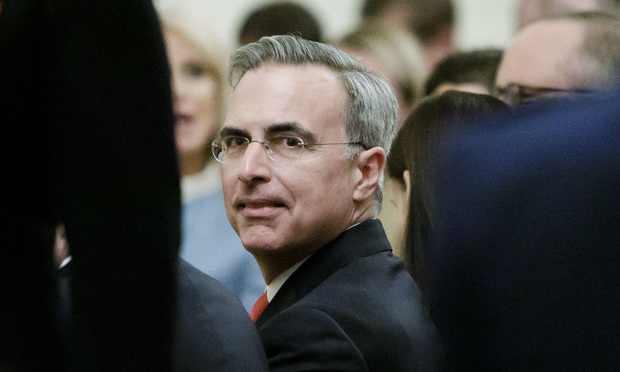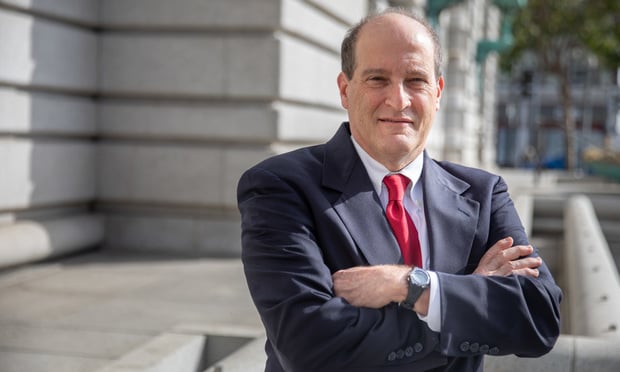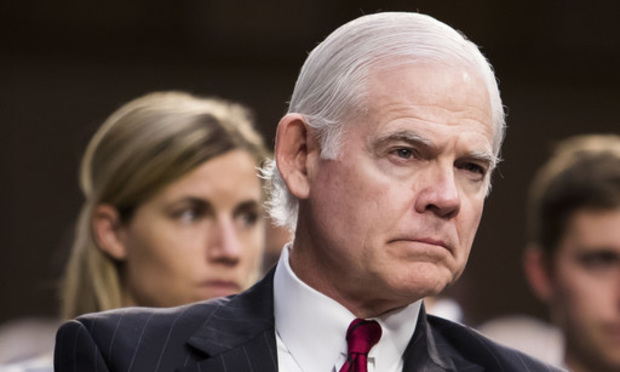Could Bolton Be an Impeachment Witness? Here's What the Lawyers Have Said
There are still open questions about how Bolton could be called in as a witness.
January 27, 2020 at 01:17 PM
8 minute read
 John Bolton, national security advisor, listens during a press briefing on Monday, Jan. 28, 2019 at the White House in Washington, D.C., U.S. Photographer: Al Drago/Bloomberg
John Bolton, national security advisor, listens during a press briefing on Monday, Jan. 28, 2019 at the White House in Washington, D.C., U.S. Photographer: Al Drago/Bloomberg
Calls are increasing for the Senate to subpoena former national security adviser John Bolton to testify in the impeachment trial, after a bombshell report indicated that President Donald Trump tied Ukrainian military aid to investigations on the Bidens during conversations with Bolton.
The New York Times on Sunday reported that a manuscript of Bolton's new book, circulated at the White House for review, states that Trump told his then-national security adviser the hold on Ukrainian military aid would not be released until the Biden investigations were announced. It's an explosive revelation that contradicts Trump's legal defense in the ongoing impeachment trial.
Bolton announced earlier this month that he would comply with a subpoena for his testimony in the impeachment trial. But Senate Republicans have largely stayed away from the prospect of subpoenaing Bolton over fears of a prolonged court fight, after Trump said he would likely claim executive privilege to fight an attempt to have the former White House aide testify.
There are still open questions about how Bolton could be called in as a witness, and parties have clashed in other court fights on whether a judge would even be able to rule on testimony from witnesses in impeachment proceedings. If a subpoena is issued, he could choose to comply and ignore any legal pushback from the Trump White House, as other witnesses in the initial impeachment inquiry have done.
Any fight over testimony would also put Chief Justice John Roberts in the spotlight. Senate Minority Leader Chuck Schumer said Monday that Roberts can make a ruling on witness testimony, and then be overruled by a Senate majority. He noted that Roberts, as Chief Justice William Rehnquist did during the Clinton trial, can defer to the Senate.
University of Missouri's Frank Bowman, a law professor and author of the book "High Crimes and Misdemeanors: A History of Impeachment for the Age of Trump," said he believes any privilege raised by Trump's lawyers would be addressed by the Senate, which is sitting as the court of impeachment.
"Which would mean, in this case, John Roberts gets the first crack at it," Bowman said. He said his guess is that Roberts would "avoid this like the plague," and would be "more disposed to rule that in the matter of an impeachment trial, questions of privilege are determined by the Senate itself."
As a potential court fight hangs over the Senate impeachment trial, here's what each party involved has already said about the issue.
 White House counsel Pat Cipollone. (Photo: Diego M. Radzinschi/ALM)
White House counsel Pat Cipollone. (Photo: Diego M. Radzinschi/ALM)The White House
Justice Department attorneys have argued in Trump's defense that, while even former top White House officials are "absolutely immune" from giving testimony to Congress, a court cannot rule on the issue.
In court filings made in the lawsuit filed by Charles Kupperman, Bolton's former deputy, over his subpoena issued in the House's impeachment inquiry, the DOJ lawyers wrote that a court cannot rule on the issue and that Kupperman should follow the White House's instruction not to comply with the subpoena.
"Never before in our nation's history has a senior White House official testified before Congress pursuant to judicial compulsion. That is no accident," a November court filing by DOJ states. "Leaving the president's senior-most aides open to compelled congressional testimony would allow Congress to encroach upon the independence and autonomy of the presidency by publicly interrogating the president's closest advisors to reveal the president's thinking or influence his decision-making on sensitive or controversial matters."
DOJ lawyers also argued the House can never go to court against the executive branch in other lawsuits, including one from the House Judiciary Committee seeking testimony from former White House counsel Don McGahn as part of the impeachment inquiry.
Justice Department attorney Hashim Mooppan told a panel on the U.S. Court of Appeals for the D.C. Circuit earlier this month that a court should not issue rulings related to an impeachment inquiry, or risk compromising the independence of the federal judiciary as a whole.
 Douglas Letter, general counsel to the U.S. House of Representatives. (Photo: Jason Doiy/ALM)
Douglas Letter, general counsel to the U.S. House of Representatives. (Photo: Jason Doiy/ALM)House
House attorneys have been part of a legal battle for months over McGahn's testimony for impeachment purposes, arguing he is not "absolutely immune" from providing the subpoenaed information to Congress.
In the House Judiciary Committee lawsuit, House attorneys led by general counsel Douglas Letter, have questioned how else they would be able to obtain the information necessary for Congress' oversight powers, including impeachment, if the White House stonewalled them on the issue.
U.S. District Judge Ketanji Brown Jackson ruled last year that McGahn is not absolutely immune. She sharply criticized DOJ for its claims that the matter couldn't be resolved in court, saying those arguments "distort established separation-of-powers principles beyond all recognition."
House lawyer Megan Barbero also told the D.C. Circuit earlier this month that it should rule on the issue of impeachment testimony from McGahn.
"Even if there are political issues the courts will gladly avoid, it is the duty of the court in a case that is otherwise justiciable … to say what the law is," Barbero said at the time. "That is what we are asking the court to do."
Senate
In a court filing Friday, Senate lawyers told a judge at the U.S. District Court for the District of Columbia that they believe only the Senate should be permitted to set the rules of its impeachment trial.
Citing the U.S. Supreme Court case on the impeachment of Judge Walter Nixon, the Senate lawyers argued that "such procedural questions," such as whether to hear witness testimony "in an impeachment trial are textually committed to the Senate, and there are no judicially manageable standards to review a claim challenging these features of a Senate impeachment trial."
"The Constitution grants the Senate, and the Senate alone, the power to try impeachments and to determine its proceedings for doing so, and that power is not subject to review or interference by the Judiciary," the Senate filing states.
The brief was filed in a lawsuit from a Washington, D.C., attorney Martin McMahon, who sued last month over the procedures for the Senate trial. He argued that he and other Americans are being deprived of their right to a fair impeachment trial and sought the removal of GOP senators, including Senate Majority Leader Mitch McConnell, from the proceedings.
 Charles Cooper, of Cooper & Kirk, and Attorney General Jeff Sessions's attorney, during Sessions's testimony before the Senate Intelligence Committee, on June 13, 2017.
Charles Cooper, of Cooper & Kirk, and Attorney General Jeff Sessions's attorney, during Sessions's testimony before the Senate Intelligence Committee, on June 13, 2017.Bolton's Lawyer
Bolton's attorney, Charles Cooper, has already been to court once over whether a former White House official can be required to comply with a congressional subpoena as part of the impeachment proceedings.
Cooper was behind the lawsuit filed by Kupperman, the Bolton deputy, which was largely thought to be a test run of what a court fight would look like if Bolton were also subpoenaed. Bolton's testimony was requested, but was not the subject of a subpoena.
"Under our system of government, it does not fall to a private citizen but rather falls to the judicial department, 'to construe and delineate claims arising under express powers' granted to the legislative and executive branches, and to resolve conflicting claims by those two branches 'with respect to powers alleged to derive from enumerated powers' conferred on them by the Constitution," Cooper and other lawyers at his firm Cooper & Kirk wrote in the initial Kupperman complaint.
U.S. District Judge Richard Leon dismissed the case after the House withdrew its subpoena, seeking to avoid a drawn-out court fight that could slow down impeachment.
Read more:
'Go Find a Lawyer, Somewhere': Schiff Slams Trump Impeachment Claims Rejected by Allies
No Federalist Society or American Constitution Society Judges? Judiciary Considers Membership Ban
Roberts Admonishes Impeachment Lawyers to 'Remember Where They Are'
DC Attorney General Alleges Inaugural Committee Misused Nonprofit Funds to Enrich Trump Hotel
This content has been archived. It is available through our partners, LexisNexis® and Bloomberg Law.
To view this content, please continue to their sites.
Not a Lexis Subscriber?
Subscribe Now
Not a Bloomberg Law Subscriber?
Subscribe Now
NOT FOR REPRINT
© 2025 ALM Global, LLC, All Rights Reserved. Request academic re-use from www.copyright.com. All other uses, submit a request to [email protected]. For more information visit Asset & Logo Licensing.
You Might Like
View All
Skadden and Steptoe, Defending Amex GBT, Blasts Biden DOJ's Antitrust Lawsuit Over Merger Proposal
4 minute read
'Lack of Independence' or 'Tethered to the Law'? Witnesses Speak on Bondi
4 minute read
Trending Stories
- 1How Law Firms Can Make Business Services a Performance Champion
- 2'Digital Mindset': Hogan Lovells' New Global Managing Partner for Digitalization
- 3Silk Road Founder Ross Ulbricht Has New York Sentence Pardoned by Trump
- 4Settlement Allows Spouses of U.S. Citizens to Reopen Removal Proceedings
- 5CFPB Resolves Flurry of Enforcement Actions in Biden's Final Week
Who Got The Work
J. Brugh Lower of Gibbons has entered an appearance for industrial equipment supplier Devco Corporation in a pending trademark infringement lawsuit. The suit, accusing the defendant of selling knock-off Graco products, was filed Dec. 18 in New Jersey District Court by Rivkin Radler on behalf of Graco Inc. and Graco Minnesota. The case, assigned to U.S. District Judge Zahid N. Quraishi, is 3:24-cv-11294, Graco Inc. et al v. Devco Corporation.
Who Got The Work
Rebecca Maller-Stein and Kent A. Yalowitz of Arnold & Porter Kaye Scholer have entered their appearances for Hanaco Venture Capital and its executives, Lior Prosor and David Frankel, in a pending securities lawsuit. The action, filed on Dec. 24 in New York Southern District Court by Zell, Aron & Co. on behalf of Goldeneye Advisors, accuses the defendants of negligently and fraudulently managing the plaintiff's $1 million investment. The case, assigned to U.S. District Judge Vernon S. Broderick, is 1:24-cv-09918, Goldeneye Advisors, LLC v. Hanaco Venture Capital, Ltd. et al.
Who Got The Work
Attorneys from A&O Shearman has stepped in as defense counsel for Toronto-Dominion Bank and other defendants in a pending securities class action. The suit, filed Dec. 11 in New York Southern District Court by Bleichmar Fonti & Auld, accuses the defendants of concealing the bank's 'pervasive' deficiencies in regards to its compliance with the Bank Secrecy Act and the quality of its anti-money laundering controls. The case, assigned to U.S. District Judge Arun Subramanian, is 1:24-cv-09445, Gonzalez v. The Toronto-Dominion Bank et al.
Who Got The Work
Crown Castle International, a Pennsylvania company providing shared communications infrastructure, has turned to Luke D. Wolf of Gordon Rees Scully Mansukhani to fend off a pending breach-of-contract lawsuit. The court action, filed Nov. 25 in Michigan Eastern District Court by Hooper Hathaway PC on behalf of The Town Residences LLC, accuses Crown Castle of failing to transfer approximately $30,000 in utility payments from T-Mobile in breach of a roof-top lease and assignment agreement. The case, assigned to U.S. District Judge Susan K. Declercq, is 2:24-cv-13131, The Town Residences LLC v. T-Mobile US, Inc. et al.
Who Got The Work
Wilfred P. Coronato and Daniel M. Schwartz of McCarter & English have stepped in as defense counsel to Electrolux Home Products Inc. in a pending product liability lawsuit. The court action, filed Nov. 26 in New York Eastern District Court by Poulos Lopiccolo PC and Nagel Rice LLP on behalf of David Stern, alleges that the defendant's refrigerators’ drawers and shelving repeatedly break and fall apart within months after purchase. The case, assigned to U.S. District Judge Joan M. Azrack, is 2:24-cv-08204, Stern v. Electrolux Home Products, Inc.
Featured Firms
Law Offices of Gary Martin Hays & Associates, P.C.
(470) 294-1674
Law Offices of Mark E. Salomone
(857) 444-6468
Smith & Hassler
(713) 739-1250











